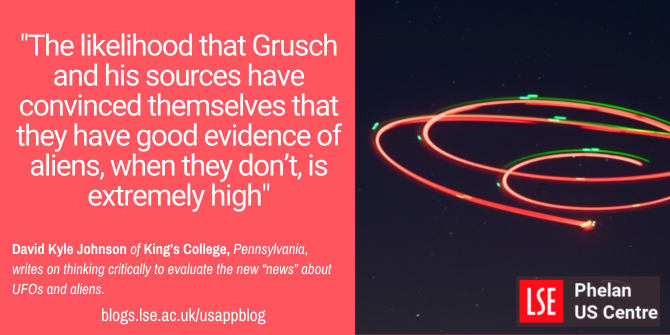 Last week, former intelligence and Air Force official, David Grusch testified to the US House Subcommittee on National Security, the Border, and Foreign Affairs that the US government is in possession of unidentified aerial phenomena (UAP) or UFO-related material, including “non-human” biological matter. It is important to critically assess such extraordinary claims when they arise, writes David Kyle Johnson, who applies both the “SEARCH” method of philosopher Ted Schick and the arguments of 18th century philosopher David Hume to evaluate Grusch’s claims.
Last week, former intelligence and Air Force official, David Grusch testified to the US House Subcommittee on National Security, the Border, and Foreign Affairs that the US government is in possession of unidentified aerial phenomena (UAP) or UFO-related material, including “non-human” biological matter. It is important to critically assess such extraordinary claims when they arise, writes David Kyle Johnson, who applies both the “SEARCH” method of philosopher Ted Schick and the arguments of 18th century philosopher David Hume to evaluate Grusch’s claims.
I teach logic and critical thinking. When doing so, one of my go-to examples of where people need to apply critical thinking (and where it is sorely lacking) is around claims about aliens and UFOs (which have recently been dubbed by believers to be UAPs, “unidentified aerial phenomena,” because of the stigma attached to the term “UFO”). It thus seems not only appropriate, but imperative, to examine the recent allegations of former intelligence and Air Force officer David Grusch. (Indeed, former students of mine have already contacted me, wanting my take on all this.) Grusch testified before congress last week and said that he has evidence that the US military is running a UAP (UFO) retrieval (and reverse engineering) program—a program which (he says) not only has been operating for decades, but has both alien craft (one of which, like the TARDIS from Doctor Who, is supposedly bigger on the inside), and non-human (aka alien) “biologics.” To examine this, I am going to apply Muhlenberg College Professor of Philosophy, Ted Schick’s “SEARCH” method, the critical thinking technique he teaches in his book How To Think About Weird Things, and which I have been teaching to my logic and critical thinking students for 15 years. It involves four steps.
A public domain video released by the US Navy of the “Tic Tac” that retired Navy pilot David Fravor said he saw in 2004 while serving with the Nimitz Carrier Strike Group. (Fravor was another whistleblower at the hearing. He recounted his personal experience; the video was taken by another pilot after his visual encounter.) What believers say is remarkable about the video is the way the object suddenly moves at the end; but it’s apparent sudden movement is just an artifact of the camera’s tracking system losing its lock on the object. The object is moving the entire video, but the camera locks onto the object and rotates to keep the object in the center of frame. The two vertical lines “zeroing in” on the object indicate a lock. The lines “relax” when the lock is lost. At the end of the video, when the camera switches modes and loses its lock, the object simply continues to move as it was, and thus goes out of frame.
Hypothesis and evaluation
The first step is simple: state the hypothesis you wish to evaluate. In this case, that’s easy. “The military is running a UAP (UFO) retrieval (and reverse engineering) program which has captured both alien craft and alien lifeforms.”
The second step is more complicated: evaluate the evidence for the first hypothesis. Why is it more complicated? In this case because, to date, Grusch has actually produced no publicly facing empirical or objective evidence for his claims. He’s just told us (and Congress) that he has evidence, including the testimony of people who work inside the program, that the hypothesis is true. So that, his testimony (primarily about their testimony), is basically the only thing we have which could be considered evidence for his claim. But not only is testimony not nearly as dependable as people often assume; as the 18th century philosopher David Hume taught us long ago, testimony is an especially unreliable guide to the truth when it comes to the occurrence of extraordinary events. Hume was talking about miracles, but his point stands for claims about aliens as well.
Hume said that, when it comes to miracles, testimony cannot justify belief in them. Why? Miracles are a violation of the laws of nature; that the laws always hold is something we have seen, repeatedly, every day, with our own eyes. The evidence we have for that is repeated and direct. Miracles, on the other hand, are rare and testimony does not produce as much justification as seeing something with your own eyes. So, the unique unrepeated evidence of someone telling you the laws were once broken (even if they are a generally reliable witness) will never outweigh direct repeated evidence you have that the laws always hold. It’s much more likely that the witness is either lying or simply mistaken.
Likewise, the evidence I have that aliens have not visited Earth is repeated and direct. Not only have I seen no good evidence of aliens visiting Earth, I have seen claimed evidence that they have (including evidence people have claimed is “absolute proof” and “the best evidence you will ever see of aliens”) debunked, over, and over, and over, and over, and over, and over, again. The unique indirect evidence of someone’s testimony that they have seen such evidence will not be able to outweigh the direct repeated evidence I already have. It is much more likely that they are lying or mistaken.
Evaluating an alternative hypothesis
Which brings us to the third step of the SEARCH method: State and evaluate an alternative hypothesis. In this case, that hypothesis would be: “Grusch is either lying, or he is mistaken about what the evidence he has entails (e.g., he misunderstood what his inside sources said, or he is mistaken about what the evidence he or they have proves).”
Some will claim that Grusch can’t be lying, because he testified under oath, before Congress. If he’s lying, he’s perjured himself, and could be found guilty of contempt. But punishment for contempt of Congress can be relatively light. At most a year in jail and $100,000; at the least, one month and a hundred bucks. (For defying a subpoena in the January 6th investigation, former White House chief strategist Steve Bannon only had to pay $6500 and spend four months in jail.) For Grusch, the subsequent notoriety and books deals could totally be worth the risk of a contempt charge.

Timelapse footage of a drone. Drones are one of many kinds of objects that are mistaken for alien craft. Airplanes, flares, birds, air balloons, optical illusions, meteors, clouds, military craft, lens flares, pie tins, satellites, the International Space Station, sky lanterns, space debris, rocket misfires, search lights, contrails, and the planet Venus have all, at one point or another, been mistaken for alien crafts. Photo by Ben Collins on Unsplash.
What’s more, if the evidence he has simply doesn’t entail what he thinks it does, he can’t be found guilty of lying; he’d just be mistaken. And that’s what seems most likely. If there is one thing I have learned in 15 years of teaching critical thinking, it’s that critical thinking skills are sorely lacking in our society, across the board. Every profession (even those that require critical thinking)—lawyers, law makers, military personnel, and even philosophy professors—contains a large collection of people that simply lack the ability to think critically. That means there are many who are not nearly as good at evaluating evidence as they think they are. The likelihood that Grusch and his sources have convinced themselves that they have good evidence of aliens, when they don’t, is extremely high.
Take Grusch’s claim that non-human “biologics” have been retrieved from crash sites. Now, “biologics” are not bodies (and he was asked if the program has alien bodies); but still, if the program has DNA confirmed to be of alien origin from a crash site—that would be a big deal. But (a) non-human doesn’t mean alien. (Birds are not humans.) And (b) someone (perhaps Grusch, perhaps one of his sources) might be convinced that some piece of biological material they were asked to evaluate is of alien origin simply because they couldn’t figure out what it was. (Indeed, given the possibility of mishandled, contaminated, incomplete, damaged, or otherwise faulty samples, I’d be surprised if this hasn’t happened multiple times.) But that’s not good logic; that’s the “mystery therefore magic fallacy”. As I often tell my students, when you can’t find a natural explanation of something, “I’m not as smart as I think I am” will always be a better explanation than “it must be ghosts/aliens/bigfoot/ESP/etc.”
Assessing the hypothesis
The last step is to compare the hypothesis according to the criteria of adequacy: testability, fruitfulness, scope, parsimony, and conservatism. I don’t have the space to explain what each of these is, but the most relevant is conservatism: does it conflict with things we already have good reason to believe are true? In this case, hypothesis 1 is the least conservative. If aliens have visited Earth, then all modern science and physics is not just incomplete, but fundamentally wrong. Given what we know about the size of the universe and how the laws of physics put limits on propulsion speeds, the chance that an alien species even could visit Earth while our species exists is near zero. The second hypothesis just assumes that people are lying or mistaken; and we already know that can and does happen; it happens every day.
To be fair, Grusch doesn’t think these aliens came from another planet; he thinks they came from another dimension. I don’t think this actually makes the first hypothesis any more conservative (while some theories in physics hypothesize “extra-dimensions,” that’s not the same as thing as “other dimensions/universes” where “aliens” might live). But I know it makes the first hypothesis less “parsimonious.” It requires us to assume the existence of unprovable inconceivable “dimension jumping” technology. The second hypothesis just calls us to assume that people are easily mistaken—which, again, we already know is the case. To put it simply, Occam’s razor favors hypothesis 2. Clearly, it is the more reasonable of the two.
I’d be glad to be proven wrong; if aliens have visited Earth, maybe they can help us with climate change (which, let’s be honest, given that we just lived through the hottest month (July) on record (and in 120,000 years), that’s what we should be talking about.) But extraordinary claims require extraordinary evidence. To date, David Grusch has provided none.
- A version of this article also appeared at Psychology Today. Dr. Johnson also maintains a blog on Medium.
Please read our comments policy before commenting.
Note: This article gives the views of the author, and not the position of USAPP – American Politics and Policy, nor the London School of Economics.
Shortened URL for this post: https://bit.ly/44Og8tP







I enjoyed this, but I think some of the statements are or may be incorrect, and in each case the mistakes make Grusch’s case look worse. (I’m not trying to make a case that Grusch is correct or truthful in what he’s saying — but I am making the case that it’s not obvious that he’s lying or, for the most part, incorrect. It’s true that he hasn’t given us evidence, and we should wait to see evidence before believing his story.
1) “UFOs (which have recently been dubbed by believers to be UAPs, ‘unidentified aerial phenomena,’ because of the stigma attached to the term ‘UFO’).” The stigma may have lead some to use UAP instead of UFO, but the U.S. government is using UAP, and I’ve heard that at least one reason for that is that some of the objects being referred to (or at least in one case) are actually underwater (not “flying”). I’ve heard the ‘A’ in ‘UAP’ stands for “aerial” but I’ve also heard that it was switched to “anomalous,” which seems to be the usual way U.S. government websites define UAPs. (I’ll stick with UFO.)
2) It was Grush’s job (or one of his assignments) in the government to gather information from other government officials who were purportedly working directly with alien craft and the remains of aliens. Grusch states in at least one video interview that the multiple people who told him about government research on aliens told him about bodies and vehicles and that some of these people said they’d touched them and certainly seen them. I think he said in his testimony before the committee that he’d talked to 40 or so. A man given high security clearances, assigned to find government research programs and describe them, can be expected to be more careful than most of the people who would pass on stories about aliens. Grusch is not alone, and I don’t see how this can be casual on his part. It’s possible that he’s mistaken, particularly in a detail here and there, but “mistaken” is improbable. (The Debrief (link below) published the first story about Grusch’s allegations. That article goes on at length about other government officials who knew Grusch and who said he was trustworthy and stable (my words), so I ‘m very doubtful this is a case of a man pulling a con game or grossly mistaken because of gross incompetence. I’m doubtful, but I can’t rule it out. Another possibility is insanity. That link (it’s lengthy, but fascinating): https://thedebrief.org/intelligence-officials-say-u-s-has-retrieved-non-human-craft/
3) You mention Grusch could have an ulterior motive, even for saying something he knows he might well spend time in jail for, and that publishing a book would get him enough money to make it worthwhile. I think the earnings from a book would be substantial only if the book were a best-seller, which his might be. (He might also make good money from a lecture tour.) He’s said he’d like to start his own nonprofit dedicated to UFO reports, according to reporter Ross Coulthart, who interviewed Grusch for News Nation (the second news organization to report on this, later on the same day as the Debrief report). A nonprofit can certainly be milked for good money, if it gets contributions. So can keeping your job.
4) Grusch says his motivation for making his public statements is partly to protect himself. He filed his whistleblower reports with multiple inspector generals, including the inspector general for intelligence agencies. That IG sent a message to the Congressional committee saying Grusch’s story is both “urgent” and “credible.” One or more IGs are investigating Grusch’s assertions.
5) Congress established a whistleblower program specifically for people reporting government activities and research to reports of aliens, and Grusch has used it. He said that after sending a detailed report about research into UFO vessels and remains to the head of Pentagon’s All-domain Anomaly Resolution Office, he was ignored, and that administrator, Sean Kirkpatrick, later stated the government had no knowledge of such programs. It seems to me that if Kirkpatrick is truthful and accurate, then Grusch isn’t, and vice versa (or possibly both are wrong). Investigators with the House government operations committee are looking into it, so I suppose we’ll know one way or the other.
6) Yes, extraordinary claims require extraordinary evidence, but Grusch has said he’s given the committee and the IG the names of sources and information from written reports from those sources and others. Extraordinary claims from someone trusted enough to be given security clearances and backed up by other officials who say he’s credible and seems trustworthy — well, that requires investigation. And my understanding is that Grusch doesn’t expect to be believed until there’s evidence. He’s going public to pressure congress and the government to look into this. He claims there have been active efforts, some of them violent and illegal, to retaliate against him for his reports up the chain of command and to the inspector generals. I think a credible source, something many on the committee and at least one IG say Grusch is, requires further investigation.
7) “To be fair, Grusch doesn’t think these aliens came from another planet; he thinks they came from another dimension. […] It requires us to assume the existence of unprovable inconceivable “dimension jumping” technology.” Any (or almost any) story about UFOs requires the existence of unprovable, inconceivable tech. That’s in the nature of any purported advanced alien civilization that for some reason might visit here. As Arthur Clarke said, any tech from a sufficiently advanced civilization will be indistinguishable from magic.
Grusch isn’t asking anybody to believe what he’s saying is true: He’s saying it easily could be true (and he thinks it is) but it absolutely requires investigation to establish that. He says there’s been an active effort to cover it up for decades.
I know you used this as an example to show how good critical assessing works, but I worry that Grusch’s claims will be dismissed too quickly by many, even though they don’t appear (to me, anyway) to be all that kooky on close examination.
I was excited about this article but found one issue in your analysis: the assumption that our current understanding of how space travel works is the one and only way to travel in space. Simply, we don’t know what we don’t know. And assumptions about science and physics have been proven wrong before, many times in history. A sufficiently advanced civilization could have technology to travel interstellar distances in space, and there’s some theories that cover this (e.g: wormholes). We also don’t know where an alien civ could come from: if they are from Proxima Centauri then it could have taken them a few decades to come here! Our understanding of the universe is too incomplete.
The article also doesn’t cover the testimonies from Navy pilots (of which only two testified, but there are many more). Are they also lying? And why?
Instead, how about you evaluate the testimonial evidence on its own merits? I’d like to see an analysis of the Navy pilots and Grusch’s testimonies based on their possible outcomes: if they all are lying what does that say about the US govt? If they’re not lying, then what are the possible explanations? How can multiple Navy pilots (trained observers) all be mistaken?
There’s a joke I don’t really remember about a bunch of economists who keep walking by a hundred dollar bill on the sidewalk, because they know there’s no such thing as a free lunch, so it can’t really be there. That’s what this article reminds me of.
I wonder how the “critical thinking” framework presented here have handled the widespread rumors of the NSA and Five Eyes spying programs, many aspects of which turned out to be true, but were routinely “debunked” via pieces like this one until a single insider, Snowden, was willing to put his life on the line to disclose what tens of thousands of other insiders could have, but instead kept secret for years/decades, because serious laws with serious teeth do in fact buy silence on topics that are shocking to begin with.
Or how this framework would have handled describing the iPhone to a scientist from 75 years ago, or really any other major leap in technology or industry, most of which would have been unthinkable just decades prior. Major shifts in our understanding of what is possible are not miracles, they have been semi-regular occurrences over recent lifetimes.
Anyway, back to Grusch. The specifics of his testimony are that he has a list of 40 credible witnesses who have told him convincingly about government programs involving exotic technology, and are in reasonable positions to know. If you want to hold out that what is finally at the end of these threads are actually human technology that is so shockingly advanced as to appear alien to knowledgeable observers with access to the best sensors and technology in history; or similarly but with some unknown-to-most natural phenomenon; or that they are black programs having nothing to do with aliens but are so shocking or disturbing that the government would rather have them labelled as aliens; OK. Or maybe it’s straight up embezzlement.
What I’m pretty sure it’s not is nothing. What we need from our citizenry now is not “aliens can’t exist so let’s move on”, but a demand for routine human investigation of alleged crimes (non-disclosure, misappropriation, obstruction, witness intimidation) that can in fact be investigated via normal means if we have the will to demand it. Let’s get these witnesses whatever protection they need, let’s get their testimony under oath, and let’s keep peeling back the onion layers until we finally know what’s what.